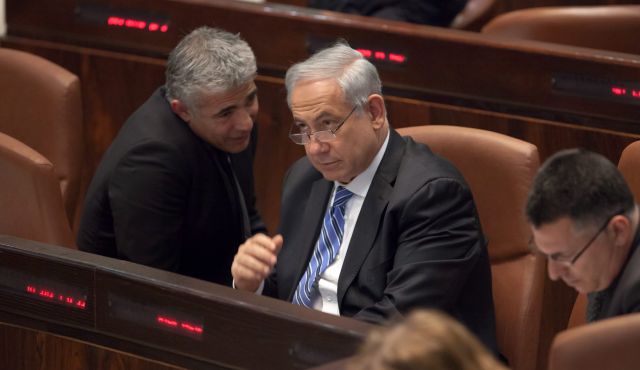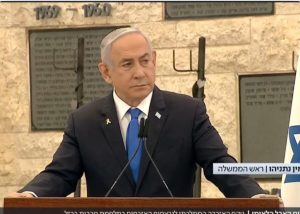Netanyahu-Lapid-knesset-EMIL-SALMAN-300x173.jpg" alt="Netanyahu and Lapid in Knesset. Photo: Emil Salman" width="300" height="173" /> Netanyahu and Lapid in Knesset. Photo: Emil Salman
Tel Aviv, 26 Dhulqa’dah 1435/21 September 2014 (MINA) – Israeli regime Prime Minister Benjamin Netanyahu and Finance Minister Yair Lapid have in recent days agreed on a framework that would resolve any dispute over the 2015 state budget.
According to the agreement, the deficit will be raised by 9 billion shekels ($2.46 billion), from 2.5 percent to 3.4 percent. The defense budget will receive additional 6 billion shekels, Haaretz quoted by Mi’raj Islamic News Agency (MINA) as reporting.
It was also agreed that Lapid’s zero-VAT housing plan will be sent to the Knesset floor for approval; no new taxes or spending cuts will be introduced in 2015; and the Tax Authority will enforce tax laws more stringently.
The deal was reached in talks between senior officials in the Prime Minister’s Office and figures close to Lapid. On Sunday, Netanyahu and Lapid will meet privately to cement the agreement.
Also Read: Hamas Denies Israeli Claim of Ending Ceasefire
The Israeli Defense Minister Moshe Ya’alon commented on the defense budget and the cost of Operation Protective Edge during Calcalist’s Economic Forum last Tuesday, and said that though military expenses are high, the expense is required to deal with the new form of terror threats Israel is faced with.
“The direct cost of the operation stands at more than $9 billion,” the defense minister said, adding that dealing with Palestinian fighters is “expensive,” and that even if the “defense budget would be tripled it would still not be a waste of money,” according to Ynet report quoted by Mi’raj Islamic News Agency (MINA).
He further claimed that the Iron Dome missile defense system saved Israel from being forced to take over Gaza and allowed life in Israel to continue as normal, thus minimizing the economic cost of the war. “Each Iron Dome interceptor is $100,000. In economic terms it’s worthwhile, but obviously this is still expensive.”
Ya’alon also responded to what he described as “ministers who claim that the treats on Israel have decreased.”
Also Read: Israeli Army Seizes Over 1,000 Dunums of Palestinian Land in Northern Jordan Valley
According to Ya’alon, “though the claim that there are no longer conventional military threats is mostly true – there is peace with Egypt, peace with Jordan, Syria is busy with infighting, and no Iraqi forces mounting – but nonetheless, regional developments forces us to deal with terror groups with state-like abilities – and dealing with this challenge is expensive.”
Ya’alon stressed that military intelligence was the key and also the most expensive in this regard. “What holds back our ability give better intelligence is money. The enemy also knows how to use technology and this forces us to deal with that as well. ”
Economy Minister Naftali Bennett also spoke at the conference, and said the army needs to be more efficient if it wants more money. Spinning a famous quote from Prime Minister Benjamin Netanyahu, Bennett quipped: “If they grow efficient, they’ll get funds. If they don’t, they won’t get money.” (Netanyahu said once of the Palestinians: “If they give, they’ll get.”)
Bennett seemed to reference both the army in general and soldiers themselves, saying soldiers should get benefits and assistance on the basis of the level of their sacrifice.
Also Read: 21 Palestinians Killed in Israeli Airstrikes Across Gaza in Major Ceasefire Violation
Bennett lamented the fact that “a soldier wounded in a car crash gets the same treatment as a soldier wounded in London. Soldiers at the home front should not get the same benefits as combat soldiers.” Ya’alon: It’s ‘expensive’ to fight terror, Gaza op cost $9b.At cost of $100,000 per interceptor, defense minister says Iron Dome is expensive, but prevented greater economic losses.(T/R04/P3)
Mi’raj Islamic News Agency (MINA)
Also Read: Israeli Airstrikes Kill at Least 10 Palestinians Across Gaza

































 Mina Indonesia
Mina Indonesia Mina Arabic
Mina Arabic